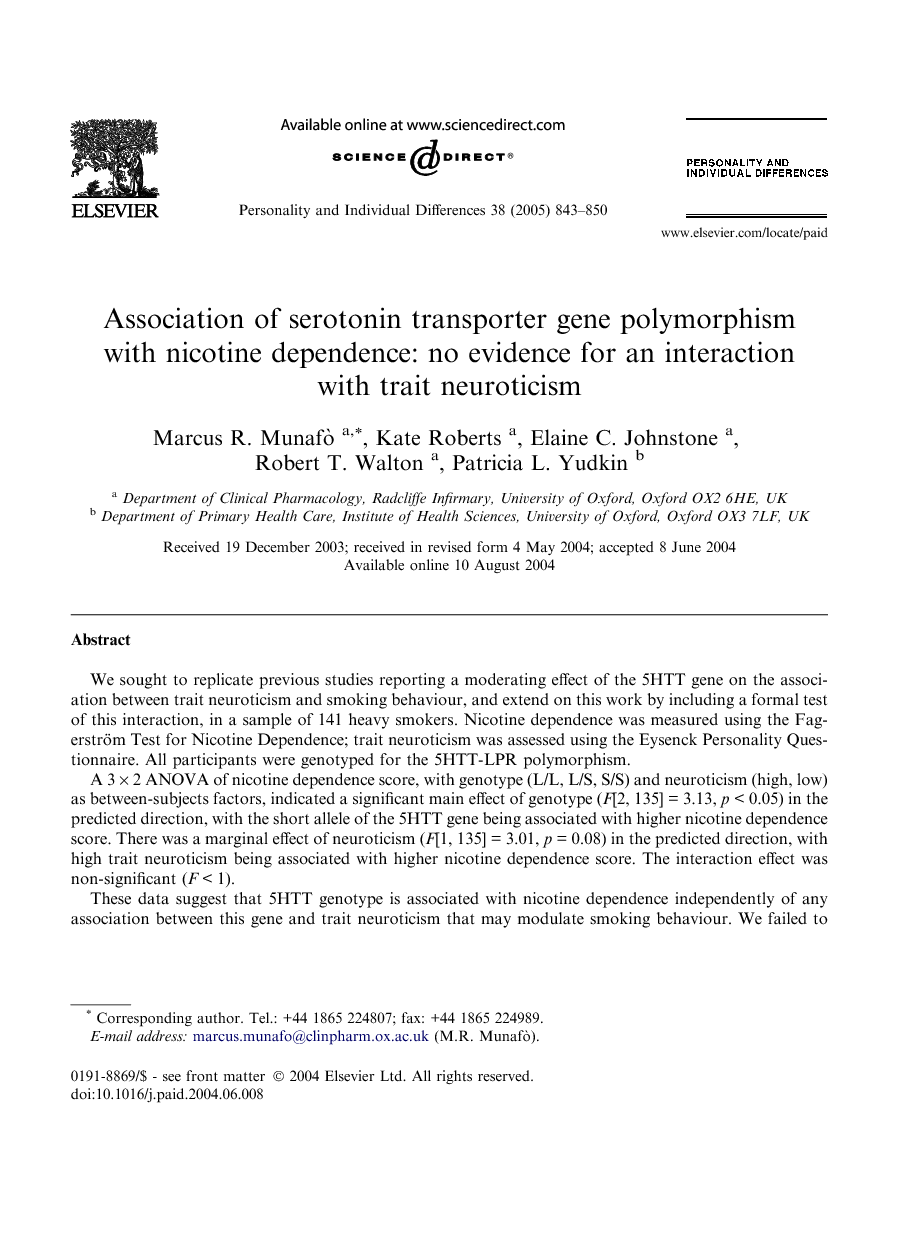We sought to replicate previous studies reporting a moderating effect of the 5HTT gene on the association between trait neuroticism and smoking behaviour, and extend on this work by including a formal test of this interaction, in a sample of 141 heavy smokers. Nicotine dependence was measured using the Fagerström Test for Nicotine Dependence; trait neuroticism was assessed using the Eysenck Personality Questionnaire. All participants were genotyped for the 5HTT-LPR polymorphism.
A 3 × 2 ANOVA of nicotine dependence score, with genotype (L/L, L/S, S/S) and neuroticism (high, low) as between-subjects factors, indicated a significant main effect of genotype (F[2, 135] = 3.13, p < 0.05) in the predicted direction, with the short allele of the 5HTT gene being associated with higher nicotine dependence score. There was a marginal effect of neuroticism (F[1, 135] = 3.01, p = 0.08) in the predicted direction, with high trait neuroticism being associated with higher nicotine dependence score. The interaction effect was non-significant (F < 1).
These data suggest that 5HTT genotype is associated with nicotine dependence independently of any association between this gene and trait neuroticism that may modulate smoking behaviour. We failed to replicate the finding of a moderating influence of 5HTT genotype on the association between neuroticism and nicotine dependence.
Investigation of the association between DNA variants and psychological phenotypes has the potential to determine which genes influence heritable psychological and behavioural traits. However, due to the possibility of genetic pleiotropy (i.e. the effect of a single gene on several traits), such association studies carry the risk of potential confounding. A good example of this is the serotonin transporter gene (5HTT), which encodes a transmembrane transporter responsible for reuptake of serotonin at the synapse. Serotonin itself plays a role in the physiology of a range of neuropsychiatric disorders and normal behaviours, and serotonergic agents are of central importance in neuropharmacology (Veenstra-VanderWeele, Anderson, & Cook, 2000). A functional polymorphism in the promoter region of the 5HTT gene (5HTT-LPR) has been identified and is known to be associated with altered serotonin activity, with the short form of this polymorphism being associated with reduced transcriptional efficiency of the 5HTT promoter, thereby decreasing serotonin transporter expression and serotonin uptake (Heils et al., 1996).
The 5HTT gene has been investigated extensively in association with anxiety-related personality traits such as neuroticism, and a recent meta-analysis supported an association between the short form of this gene and elevated neuroticism (Munafò et al., 2003). The same polymorphism has also been investigated in relation to smoking behaviour, and another recent meta-analysis also provides support for the association between this gene and smoking behaviour, although here the corpus of published data is smaller than in the case of neuroticism (Munafò, Clark, Johnstone, Murphy, & Walton, 2004b). There are good theoretical and empirical grounds for positing a role for this gene in relation to both anxiety-related personality traits such as neuroticism (Lesch, 1996) and addictive behaviours such as smoking (Lerman et al., 2001), with evidence in both cases for the short allele acting in a dominant fashion.
It is possible, however, that the association between the 5HTT gene and smoking behaviour is mediated entirely by neuroticism, so that there is no residual direct association between this gene and smoking behaviour. This possibility is strengthened by strong evidence for an association between elevated neuroticism and smoking behaviour (e.g. Reuter & Netter, 2001). Lerman and Niaura (2002) suggest that genetic influences on smoking behaviour may be mediated by such individual differences in biologically-based behavioural traits, such as personality, as well as individual differences in nicotine metabolism and the reinforcing properties of nicotine. However, Lerman et al. (2000) report an interaction between the 5HTT gene and neuroticism, with neuroticism being positively associated with smoking practices, including nicotine dependence, only among smokers who possess one or more copies of the short allele of the 5HTT gene. This suggests that rather than mediating the association between the 5HTT and smoking behaviour, neuroticism may act to moderate this association. The relationship between neuroticism, 5HTT genotype and smoking behaviour may therefore be a complex one, and Lerman et al. (2000) tentatively suggest that smoking may be associated with a “genetically-based” form of neuroticism.
However, Lerman et al. (2000) did not formally test the interaction between the 5HTT gene and neuroticism; instead, the association between nicotine dependence and neuroticism was calculated separately for the “short” (one or more copies of the short allele) and “long” (two copies of the long allele) 5HTT genotype groups. Moreover, individuals homozygous for the short allele and heterozygotes were combined into a single “short” genotype group. Although there is some evidence that the short allele acts in a dominant manner, the usual reason for combining genotype groups is because there are insufficient individuals homozygous for the short allele in small samples.
We therefore sought to determine whether polymorphism in the 5HTT gene is associated with nicotine dependence when including the potential confounding effect of trait neuroticism in a sample of participants in a study of smoking cessation recruited from the general population in the United Kingdom. We also sought to replicate the findings of Lerman et al. (2000), and extend on this previous work by including a formal test of the reported moderating influence of neuroticism by testing the interaction between 5HTT genotype and trait neuroticism and by including all three 5HTT genotype groups in our analysis.


